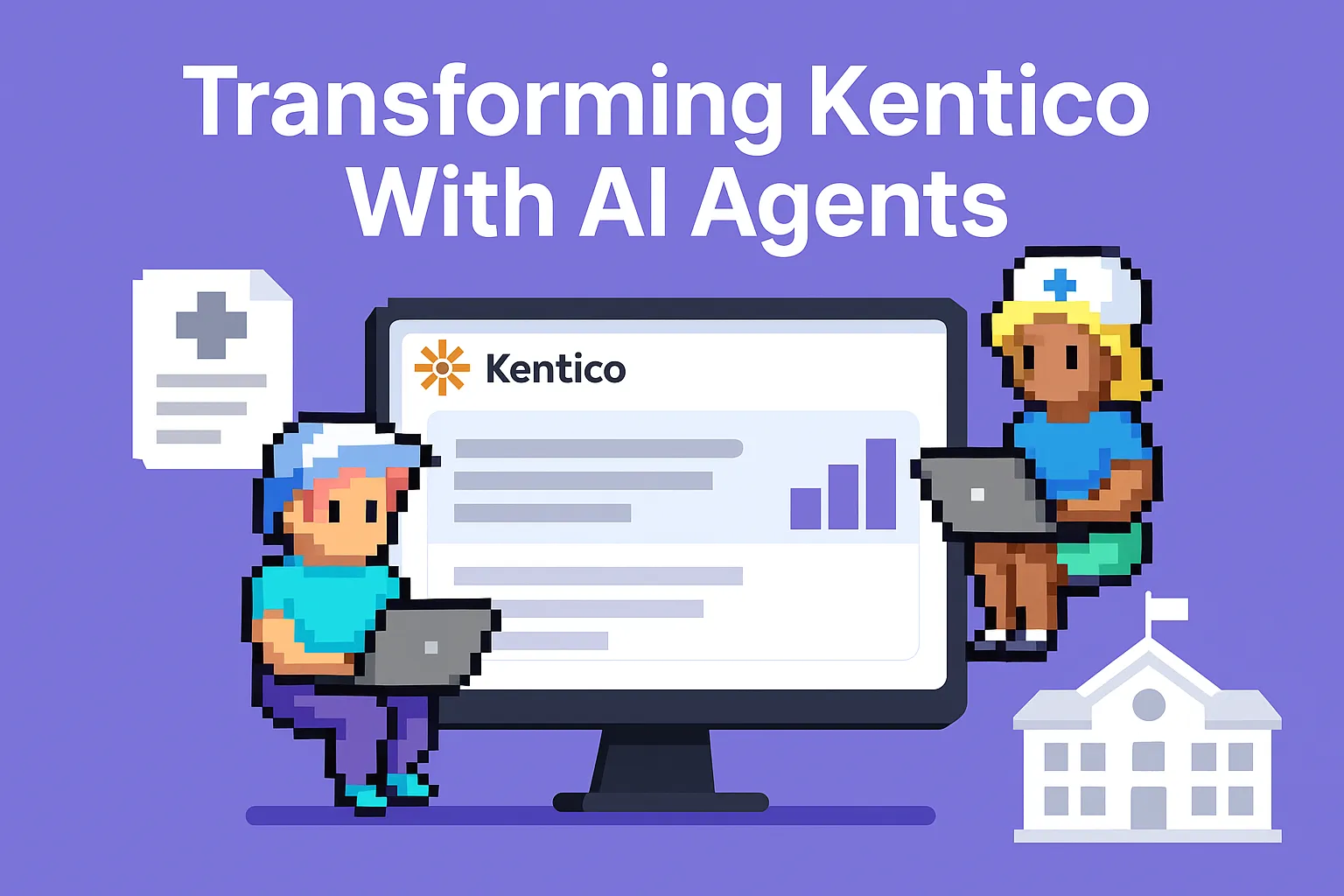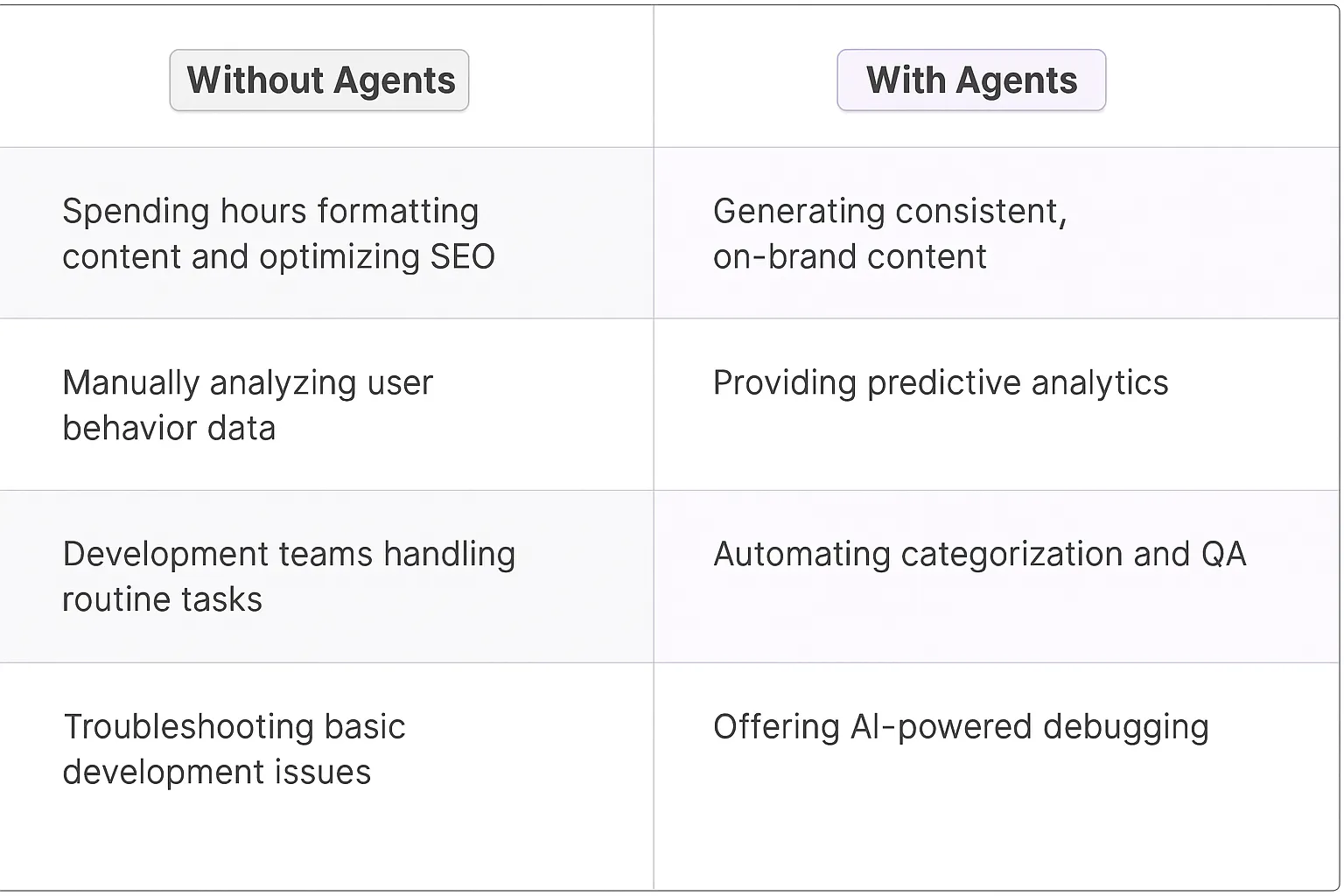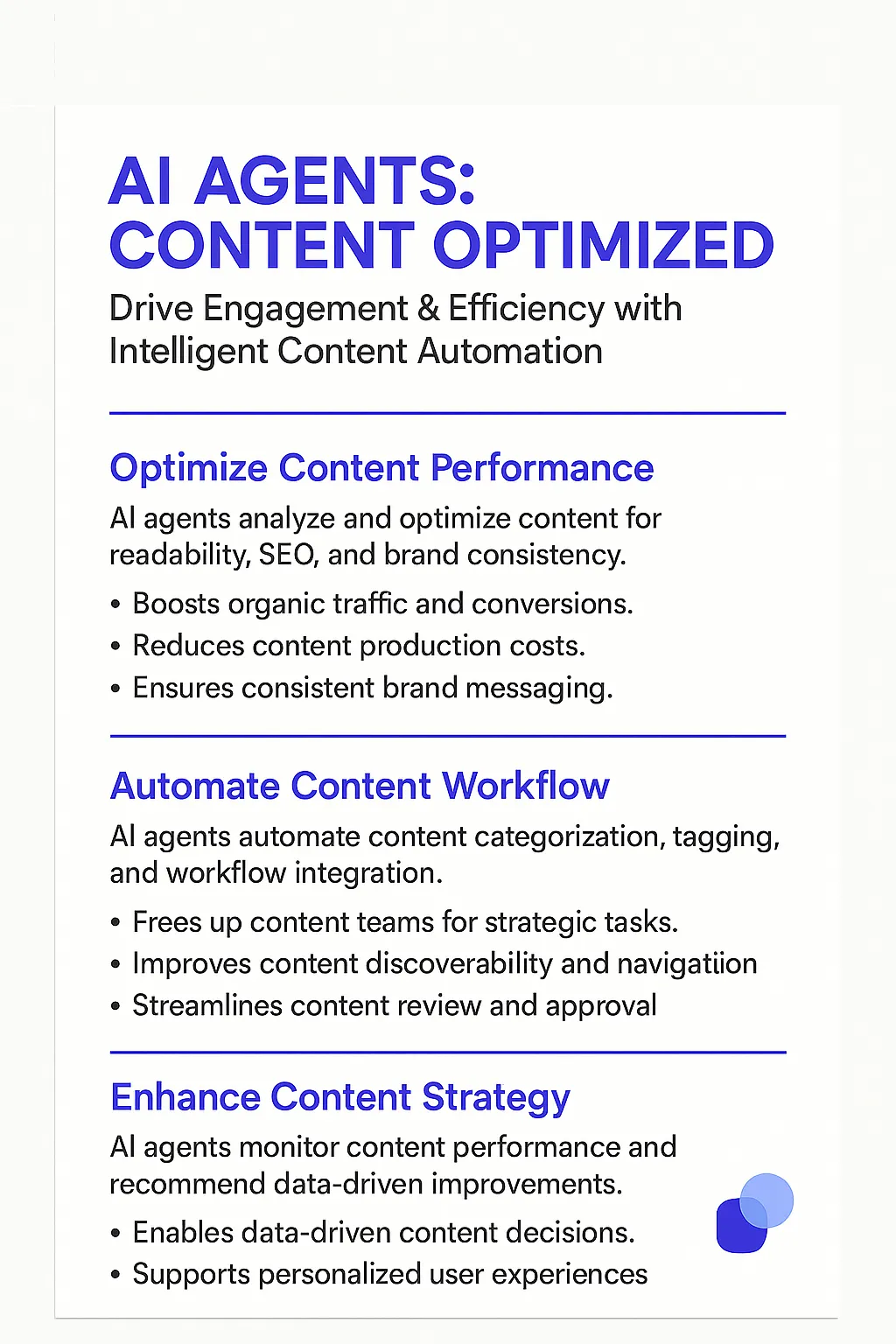Kentico
Understanding Kentico's Enterprise CMS Platform
Kentico is an enterprise-grade content management system that powers digital experiences for organizations worldwide. The platform combines robust content management capabilities with built-in marketing tools, e-commerce functionality, and extensive customization options. Its modular architecture supports everything from basic websites to complex digital ecosystems serving millions of users.
Key Features of Kentico
- Advanced content management workflows and versioning
- Built-in marketing automation and campaign management
- E-commerce capabilities with multi-store support
- Extensive API support for custom integrations
- Granular user permissions and role management
- Multi-language and multi-site management
- Powerful personalization and A/B testing tools

Benefits of AI Agents for Kentico
What would have been used before AI Agents?
Traditional Kentico CMS implementations relied heavily on manual content management processes. Content teams spent countless hours formatting text, optimizing SEO metadata, and ensuring content consistency across multiple channels. Marketing managers needed to manually analyze user behavior data and make educated guesses about content performance. Development teams handled repetitive tasks like template creation and basic troubleshooting that consumed valuable time better spent on strategic initiatives.
What are the benefits of AI Agents?
AI Agents transform how teams work with Kentico by introducing intelligent automation that fundamentally changes content operations. These digital teammates handle the heavy lifting of content management while providing strategic insights:
- Intelligent Content Generation: AI Agents analyze existing content patterns and brand guidelines to generate consistent, on-brand content suggestions. They can draft product descriptions, blog posts, and meta descriptions that maintain the organization's voice while optimizing for search engines.
- Predictive Analytics Integration: Rather than waiting for quarterly reports, AI Agents continuously monitor content performance metrics and user behavior patterns. They surface actionable insights about which content resonates with specific audience segments and why.
- Automated Workflow Enhancement: The agents handle routine tasks like content categorization, tag management, and basic QA checks. This shifts human focus to high-value creative and strategic work that drives business growth.
- Personalization at Scale: AI Agents analyze user behavior patterns to automatically adjust content presentation and recommendations. This creates tailored experiences without requiring manual segmentation and content mapping.
- Technical Support Evolution: Development teams gain AI-powered debugging assistance and code optimization suggestions. This reduces time spent on common issues and accelerates development cycles.
The network effects are particularly powerful - as AI Agents learn from interactions across the Kentico ecosystem, they become increasingly effective at predicting needs and suggesting optimizations that benefit the entire user base.

Potential Use Cases of AI Agents with Kentico
Content Management Processes
Digital teammates integrated with Kentico transform how teams handle content operations. They scan through content repositories, identify outdated materials, and flag them for updates. When new content needs publishing, these AI agents automatically check for SEO optimization, validate metadata, and ensure brand voice consistency across all pieces.
The agents monitor content performance metrics, analyzing user engagement patterns and providing actionable recommendations for content optimization. They can detect content gaps in your digital strategy and suggest topics that align with your audience's interests.
Technical Tasks
AI agents excel at managing Kentico's technical infrastructure. They monitor system health, track resource usage, and predict potential bottlenecks before they impact performance. When traffic spikes occur, these digital teammates automatically adjust caching strategies and optimize database queries.
For developers, AI agents assist with code reviews, checking for best practices in Kentico-specific implementations. They analyze custom modules for potential security vulnerabilities and suggest performance improvements based on established patterns.
Workflow Optimization
The integration of AI agents within Kentico workflows creates significant efficiency gains. These digital teammates handle routine tasks like content categorization, tag management, and URL structure optimization. They analyze user behavior patterns to suggest personalization rules and content variants that drive engagement.
When marketing campaigns launch, AI agents track performance metrics in real-time, making autonomous adjustments to content delivery based on user response data. They manage A/B testing scenarios, automatically directing traffic to better-performing variants while maintaining statistical significance.
User Experience Enhancement
AI agents continuously analyze user interactions within Kentico-powered websites. They identify navigation patterns, spot user friction points, and suggest UX improvements. The agents process user feedback and support tickets, categorizing issues and prioritizing fixes based on impact severity.
For e-commerce implementations, these digital teammates optimize product recommendations, adjust search algorithms based on user behavior, and fine-tune conversion funnels through automated analysis of drop-off points.
Compliance and Security
AI agents serve as vigilant guardians of compliance requirements. They scan content for regulatory violations, ensure GDPR compliance in data collection practices, and maintain audit trails of content changes. These digital teammates monitor security logs, detect unusual patterns, and respond to potential threats before they escalate.
The agents also manage content accessibility, checking for WCAG compliance and suggesting improvements to make content more inclusive and accessible to all users.

Industry Use Cases
AI agents are transforming how organizations leverage Kentico's content management capabilities across multiple sectors. The integration creates fascinating new possibilities for content teams, marketers, and digital experience builders who rely on Kentico's platform. Let me break down the real-world applications I'm seeing emerge.
What's particularly compelling is how these digital teammates enhance Kentico's core strengths in personalization and content delivery. Through my work with startups and enterprises, I've observed AI agents becoming essential partners in content operations - not just handling routine tasks, but actively contributing to strategic content decisions.
The most successful implementations I've analyzed share a common thread: they focus on augmenting human creativity rather than replacing it. These AI agents excel at processing vast amounts of content data, identifying patterns, and suggesting optimizations that content teams might otherwise miss. The following industry examples demonstrate how organizations are achieving measurable gains by thoughtfully deploying AI within their Kentico environments.
For content management systems like Sanity, similar patterns emerge where AI agents enhance rather than replace human creativity in content operations.
Healthcare Industry: AI-Powered Patient Experience Management
Healthcare providers face mounting pressure to deliver personalized digital experiences while maintaining HIPAA compliance and managing complex content workflows. A Kentico AI Agent transforms how medical organizations handle their web presence and patient communications.
The AI Agent integrates directly with Kentico's content management system to analyze patient interaction patterns and automatically optimize content delivery. For example, when a regional hospital network needs to communicate urgent care wait times across 25 locations, the AI Agent can dynamically update wait time information, suggest optimal routing for patients, and personalize content based on patient history and preferences.
Beyond basic content updates, the AI Agent serves as a sophisticated digital teammate for healthcare marketing teams. It can:
- Monitor patient feedback across all digital touchpoints and proactively suggest content improvements
- Generate HIPAA-compliant medical content variations for different audience segments
- Analyze engagement metrics to identify which health resources resonate most with specific patient demographics
- Create localized versions of critical health information for multi-language patient populations
The real power emerges when healthcare providers connect the AI Agent to their patient data systems. One medical center saw a 47% increase in online appointment bookings after implementing AI-driven personalization that tailored content and calls-to-action based on individual patient histories and needs.
This level of intelligent automation allows healthcare organizations to scale their digital presence while maintaining the personal touch that patients expect from their healthcare providers. The AI Agent handles the complex task of content optimization while medical professionals focus on what matters most - patient care.
Education Sector: AI-Enhanced Learning Content Management
Educational institutions manage massive amounts of content across departments, programs, and student populations. A Kentico AI Agent transforms how universities and schools handle their digital educational materials while maintaining academic standards and accessibility requirements.
The AI Agent works natively within Kentico's CMS to analyze student engagement patterns and optimize learning resource delivery. When a university needs to manage course materials across 50 different departments, the AI Agent automatically categorizes content, suggests cross-references between related materials, and adapts presentation based on student learning patterns.
The AI Agent functions as a digital teammate for academic content teams by:
- Analyzing student interaction data to identify knowledge gaps and recommend additional resources
- Converting complex academic content into multiple formats for different learning styles
- Generating metadata tags for improved searchability of educational materials
- Creating accessible versions of content that meet WCAG guidelines
- Adapting content difficulty levels based on student performance metrics
The system's true potential shines when connected to learning management systems (LMS). A leading state university implemented AI-driven content optimization and saw a 38% increase in student engagement with digital learning materials. The system identified patterns in how students consumed content and automatically adjusted presentation formats to match individual learning preferences.
This intelligent approach to educational content management enables institutions to scale their digital learning resources while maintaining educational quality. The AI Agent handles complex content optimization tasks while educators focus on teaching and student success.
Data from early adopters shows that AI-enhanced content management leads to measurable improvements in student outcomes. One community college reported a 25% increase in course completion rates after implementing AI-driven personalization of learning materials.
Considerations and Challenges
Implementing AI agents within Kentico requires careful planning and strategic consideration across multiple dimensions. The complexity stems from both technical architecture and organizational readiness.
Technical Challenges
Integration with Kentico's content management workflows presents several hurdles. The AI agent needs to parse and understand Kentico's content structure, metadata schemas, and workflow states. Custom development is often necessary to handle content type mappings and maintain data consistency across the CMS.
Performance optimization becomes critical when the AI agent processes large content repositories. Response times can degrade as content volume grows, requiring sophisticated caching strategies and queue management. Teams must implement proper error handling and fallback mechanisms for when AI services experience latency or downtime.
Operational Challenges
Content teams need clear guidelines on AI agent capabilities and limitations. Without proper training, teams may either underutilize the technology or develop unrealistic expectations. Creating detailed documentation and use cases helps bridge this knowledge gap.
Governance becomes more complex with AI-assisted content operations. Teams must establish clear approval workflows, quality control checkpoints, and content validation processes. This includes defining when human review is mandatory versus optional.
Cost Management
AI agent usage costs can escalate quickly without proper monitoring and controls. Teams should implement usage tracking, set up alerting for unusual patterns, and establish cost allocation models across departments. Regular audits help identify opportunities for optimization and prevent budget overruns.
Security Considerations
AI agents require access to sensitive content and systems, creating potential security vulnerabilities. Implementing proper authentication, encryption, and access controls is essential. Teams must also consider data residency requirements and ensure compliance with privacy regulations when processing content through AI services.
Transformative Impact of AI Integration in Content Management
The integration of AI Agents with Kentico represents a significant evolution in content management and digital experience delivery. Organizations across industries are discovering the transformative impact of these digital teammates on their content operations. While challenges exist around implementation, governance, and cost management, the benefits of enhanced productivity, personalization, and strategic insights make this integration increasingly valuable.
Success with AI Agents in Kentico depends on thoughtful implementation strategies that balance automation with human oversight. Organizations that approach this integration with clear objectives and proper governance frameworks position themselves to unlock new levels of digital experience management while maintaining control over their content operations.













